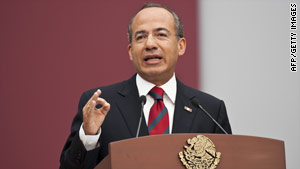Scammer
Banned

Mexican President Felipe Calderon's security plan includes eliminating more than 2,000 local police forces.
As criticism of his war on organized crime mounts, Mexican President Felipe Calderon is under increasing pressure to introduce a new security policy.
Calderon, who announced a crackdown on cartels shortly after taking office in 2006, has asked his country's congress to approve fresh measures to help in the fight. Police reforms are a key target of his administration.
"Our primary objective is to ensure that no matter who governs or which party he belongs, the Mexicans are protected by an honest and professional police, by an effective and transparent justice system," Calderon told his nation's security council when he announced the proposed reforms in June.
But taking a new tack in the controversial drug war may be difficult for Calderon, as vocal politicians express their skepticism. The president's political future -- and Mexico's security -- hang in the balance.
Calderon, whose term ends in 2012, has proposed a plan to eliminate more than 2,000 local police forces, combine them with state law enforcement agencies and unite them under federal control. He and his top security officials have argued that the move will better combat corruption and crime.
"This initiative is a response to the people's demand to have reliable police, and the necessity to strengthen the institutions of security in order to face the criminals that plague Mexico," he said earlier this year.
Federal officials have said the lower salaries of local police officers make them more susceptible to corruption. More than half of them receive monthly salaries of only 4,000 pesos (about $325).
Government estimates indicate that corruption has caused the dismissal of 3,000 police officers in recent years.
While some lawmakers support the reform, others are critical of the current strategy, which has the Mexican military as the principal enforcers of public security.
Calderon's government has dispatched about 50,000 troops to the nation's trouble spots.
"The big question for us in congress is, 'how long we will have armed forces at the forefront of the fight?'" lawmaker Carlos Navarrete said.
Calderon has said the military will not retreat in the short term, but a police overhaul would be a key step in guaranteeing security. Mexican Secretary of Public Security Genaro Garcia Luna has also proposed eliminating 2,000 local councils to strengthen security in areas with a strong presence of organized crime.
But some Mexican politicians have said they are skeptical that such reforms will do much to combat corruption.
Alejandro Gertz Manero of the left-wing Convergence Party has suggested the legislation would only be financially profitable for certain parties within congress and politically advantageous for certain officials, principally that of Calderon's right-wing National Action Party.
"So basically what's in this [legislation] is something that is in the interest of the local mayors, who are not from the same party as the governors," he said.
Meanwhile, Calderon's administration has said it is dealing severe blows to organized crime, citing such examples as the seizure of an estimated $12 billion in drugs. The Mexican navy has also had high profile takedowns of drug kingpins, including the capture of American-born cartel boss Edgar Villarreal alias "La Barbie."
But with persistent public perception about drug cartels gaining ground, Calderon has a tough battle to fight before his term ends in 2012.
A top official in Mexico's opposition Institutional Revolutionary Party has said the war on drugs cannot succeed if it remains a "fight of firepower between criminals and the state."
Mexico's government must create jobs and improve education to help fight drug trafficking, Sen. Manlio Fabio Beltrones Rivera said.
"We have seen 30,000 people die in the past four years," he said. "And we are very close to seeing, at the end of this six-year term, an equal number of dead as in the Vietnam War."
